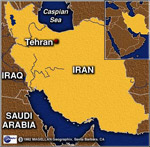 Wall Street Journal Europe – Opinion: Economic pressure is already biting but more will be needed for Tehran to drop its nuclear designs.
Wall Street Journal Europe – Opinion: Economic pressure is already biting but more will be needed for Tehran to drop its nuclear designs.
The Wall Street Journal Europe
Economic pressure is already biting but more will be needed for Tehran to drop its nuclear designs.
OPINION
 Just a month after President Obama signed the Iran Sanctions Act into law, the new restrictions appear to have gotten Tehran’s attention. Gasoline imports into the Islamic Republic fell nearly 50% in July from May, according to Energy Market Consultants. Despite being a major oil producer, Iran needs to import at least 30% of its refined gasoline for domestic consumption, and the sanctions are putting further strains on the regime. To which we say, more please.
Just a month after President Obama signed the Iran Sanctions Act into law, the new restrictions appear to have gotten Tehran’s attention. Gasoline imports into the Islamic Republic fell nearly 50% in July from May, according to Energy Market Consultants. Despite being a major oil producer, Iran needs to import at least 30% of its refined gasoline for domestic consumption, and the sanctions are putting further strains on the regime. To which we say, more please.
This has been a hard summer for the leaders of Iran. There may or may not have been an attempt on Mahmoud Ahmadinejad’s life this week—the regime can’t seem to make up its mind on how to spin what may have been a firecracker or a grenade—but there have been sectarian bombing attacks against top officers of the Revolutionary Guards, a strike in the bazaars, and a number of suspicious industrial accidents. Add to that new sanctions by the U.S., U.N. and EU and it makes for a regime that’s clearly under pressure.
The problem is that all this is unlikely to force the Iranian leadership to abandon their nuclear designs. Though sanctions have forced many Western companies to stop doing business in or with Tehran, other firms are already attempting to fill the breach.
A report released yesterday by the Washington-based Foundation for Defense of Democracies identifies 18 companies that continue to have substantial energy operations in Iran. They include Russia’s Gazprom, China’s Sinopec, Venezuela’s PdVSA, Turkey’s Tupras, and India’s Oil & Natural Gas Corporation. The report also lists Western giants such as Germany’s ThyssenKrupp, which remains involved in Iran’s refining and petrochemical sectors, and the Linde Group, which supplies LNG technology to support Iran’s natural gas developments.
One useful step the Obama Administration and its European partners could take to give the sanctions more bite is to fine companies that continue to violate the sanctions act. That’s just what the U.S. did with Holland’s ABN Amro, Britain’s Lloyd’s Bank and Switzerland’s Credit Suisse when it discovered they had provided financial services to the Islamic Republic in contravention of American laws. “The fines didn’t hurt America’s relationship with these allies but sent a ripple of fear throughout the financial sector and helped persuade other banks to terminate their Iranian ties,” says FDD Executive Director Mark Dubowitz. “Equivalent penalties on Iran’s foreign energy partners will send the same ripples of fear in the energy industry.”
Beyond sanctions, the U.S. and Europe might do more to support Iran’s brave pro-democracy movement. That movement is desperate for secure communications technology such as satellite phones, satellite subscription services and secure LAN cards. Hillary Clinton gave a moving speech earlier this year on the importance of Internet freedom, but a source tells us the State Department has been less than helpful in waiving export restrictions to get that equipment to the Iranians who desperately need it.
It would also help if President Obama gave dissident Iranian exiles some face time in the Oval Office, both as a statement of principle and a message of defiance against the rulers in Iran. Considering how well a year’s worth of his polite overtures went over with the regime, he could do worse than to repay its contempt in kind.
The risk now is that the success of the sanctions so far will lure the Administration into dropping some of them in exchange for another round of temporizing and inevitably useless negotiations with Tehran. On Tuesday, State Department spokesman Philip Crowley said the Administration sensed “that there may well be a willingness on the part of Iran to enter into the kind of dialogue that we have long sought.” He can be sure the mullahs will do their best to make the U.S. pay dearly for the pleasure of their company. Better to double down on sanctions now.


